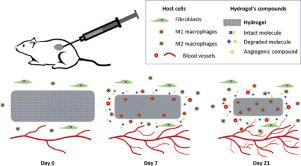Acta Biomaterialia ( IF 9.7 ) Pub Date : 2020-08-16 , DOI: 10.1016/j.actbio.2020.08.012 K R Sindhu 1 , N Bansode 2 , M Rémy 3 , C Morel 3 , R Bareille 3 , M Hagedorn 4 , B Hinz 5 , P Barthélémy 6 , O Chassande 3 , C Boiziau 3

|
Hydrogels used in regenerative medicine are often designed to allow cellular infiltration, degradation, and neovascularization. Low molecular weight hydrogels (LMWHs), formed by self-assembly via non-covalent interactions, are gaining significant interest because they are soft, easy to use and injectable. We propose LMWHs as suitable body implant materials that can stimulate tissue regeneration. We produced four new LMWHs with molecular entities containing nucleic acid and lipid building blocks and analyzed the foreign body response upon subcutaneous implantation into mice. Despite being infiltrated with macrophages, none of the hydrogels triggered detrimental inflammatory responses. Most macrophages present in the hydrogel-surrounding tissue acquired an immuno-modulatory rather than inflammatory phenotype. Concomitantly, no fibrotic capsule was formed after three weeks. Our glyconucleolipid LMWHs exhibited different degradation kinetics in vivo and in vitro. LMWHs with high angiogenic properties in vivo, were found to release glyconucleoside (glucose covalently linked to thymidine via a triazole moiety) as a common by-product of in vitro LMWH degradation. Chemically synthesized glyconucleoside exhibited angiogenic properties in vitro in scratch assays with monolayers of human endothelial cells and in vivo using the chick chorioallantoic membrane assay. Collectively, LMWHs hold promise as efficient scaffolds for various regenerative applications by displaying good biointegration without causing fibrosis, and by promoting angiogenesis through the release of a pro-angiogenic degradation product.
Statement of Significance
The main limitations of biomaterials developed in the field of tissue engineering remains their biocompatibility and vascularisation properties. In this context, we developed injectable Low Molecular Weight Hydrogels (LMWH) exhibiting thixotropic (reversible gelation) and thermal reversible properties. LMWH having injectability is of great advantage since it allows for their delivery without wounding the surrounding tissues.
The resulting gels aim at forming scaffolds that the host cells colonize without major inflammation, and that won't be insulated by a strong fibrosis reaction. Importantly, their molecular degradation releases a product (a glycosyl-nucleoside conjugate) promoting angiogenesis. In this sense, these LMWH represent an important advance in the development of biomaterials promoting tissue regeneration.
中文翻译:

通过生物活性降解产物促进血管生成的新型可注射自组装水凝胶。
再生医学中使用的水凝胶通常设计成允许细胞浸润,降解和新血管形成。低分子量的水凝胶(低分子量肝素),通过自组装而形成经由非共价相互作用因其柔软,易于使用和可注射而备受关注。我们建议LMWHs作为可以刺激组织再生的合适的人体植入材料。我们生产了四个新的LMWH,它们的分子实体包含核酸和脂质构建基块,并分析了皮下植入小鼠体内的异物反应。尽管被巨噬细胞浸润,但是没有一种水凝胶触发有害的炎症反应。存在于水凝胶周围组织中的大多数巨噬细胞获得了免疫调节而非炎性表型。同时,三周后未形成纤维化囊。我们的糖核苷酸LMWHs在体内和体外表现出不同的降解动力学。发现具有体内高血管生成特性的LMWHs释放糖核苷(通过三唑部分与胸苷共价连接的葡萄糖)是体外LMWH降解的常见副产物。化学合成的glyconucleoside显示血管生成特性在体外在划痕测定与人内皮细胞的单层和体内使用鸡胚绒毛尿囊膜分析。总体而言,LMWH通过显示良好的生物整合而不引起纤维化,并通过释放促血管生成的降解产物促进血管生成,有望作为各种再生应用的有效支架。
重要声明
在组织工程领域开发的生物材料的主要局限性仍然是它们的生物相容性和血管化特性。在这种情况下,我们开发了具有触变性(可逆凝胶化)和热可逆特性的可注射低分子量水凝胶(LMWH)。具有注射能力的LMWH具有极大的优势,因为它允许其递送而不伤及周围组织。
产生的凝胶旨在形成宿主细胞在没有重大炎症的情况下定居的支架,并且不会被强烈的纤维化反应所隔离。重要的是,它们的分子降解释放出促进血管生成的产物(糖基-核苷缀合物)。从这个意义上讲,这些LMWH代表了促进组织再生的生物材料开发的重要进展。



























 京公网安备 11010802027423号
京公网安备 11010802027423号